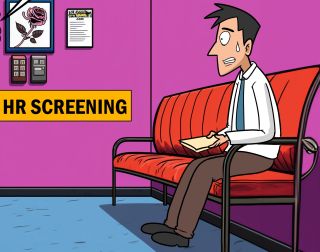Career
Traditional Job Screening Is Unfair, Damaging, and Ineffective
Why both candidates and employers pay a steep price.
Updated September 19, 2023 Reviewed by Abigail Fagan
Key points
- Anxiety should be eliminated from most screening processes.
- Fifteen percent of employees say they would put in more effort if screening had been more agreeable.
- Job interviews should be a process of mutual evaluation.

Roy had worked at my company’s (CY) call center for three years, providing outsourced phone service to a cellphone company’s clients. Despite struggling with his self-confidence, his productivity and service markers—all measured electronically—were well above average. When the same cellphone company opened an in-house call center close to his home, Roy asked us if it was OK to apply to work directly for them. Roy had a daily two-hour commute each way to get to CY, so we completely supported his efforts to find work closer to home.
Unfortunately, Roy failed to pass the call center’s screening (which was mandatory, regardless of prior experience) on two different occasions—for the exact same job he had been doing with metric-proven success for the previous three years.
Roy isn't alone. Traditional screening procedures, especially for entry level jobs, are characterized by being one sided, judgmental, cold and detached affairs that cause heightened anxiety and stress. Such screening procedures are unwise on many levels:
- Anxiety can make potentially great employees vastly underperform because of its detrimental effects on executive functions (e.g., focus, problem solving, prioritization, etc.). In fact, Research by North Carolina State University and Microsoft discovered that while none of the women candidates passed the traditional tech sector screening process, every single one of them passed the less anxiety provoking screening.
- They make the workplace inaccessible to people who need a warmer emotional environment in order to function and bring their talents to bare.
- 15% of candidates report that they would put in more effort at their new work if the screening procedure were nicer and it actually causes some of the best candidates to look for employment elsewhere—with ‘nicer’ employers.
- Screening is not about finding the best employee; it’s about finding the best match. If a role requires candidates who are low key, patient, friendly and enjoy working in a team—screening procedures should look for such qualities and not stress management.
Evoking anxiety during screening is akin to rubbing mud on a camera lens—it just obscures what you actually want to see. To discover the true potential of job candidates, screening procedures should be designed to lower anxiety to the lowest possible minimum (unless the job itself involves dealing with significant stress and pressure in an emotionally cold environment).
Following are traditional screening’s biggest anxiety triggers and how to change them:
- Eliminate the 'Fog of War': Candidates often arrive at screening without a firm idea regarding what they are going to be asked to do, who their evaluator is (other than name and rank) and what the various exercises and tasks aim to assess. Candidates aren't the enemy or adversaries, they’re all potential allies. They should know ahead of time what the screening entails and what will be asked of them.
- Adopt a 'Host' Mentality: Interviewers should view themselves as hosts, not judges—making candidates feel welcome will allow them to open up and show their strengths and character. The employer is being assessed too: Candidates are evaluating the employer and whether they would want to work with them. Creating the appropriate vibe and setting for a mutual process of evaluation is important.
- Explain, Don't Disorient: Providing context and explanation will help the candidate answer questions that might not seem relevant or ambiguous (e.g., I’m asking because your past technical experience, even if on another system, can shed light on how easy or not the training will be for you).
An anxiety free, friendlier screening process, especially for candidates who feel anxious, insecure, or shy, who lack confidence, who have been out of work for a while, or who have had bad experiences in former stress-laden assessments will allow screeners to find many diamonds in the rough (see this 2020 TED talk), and make the workplace far more equitable and accessible for those who might otherwise struggle to enter it.
References
Shields GS, Moons WG, Tewell CA, Yonelinas AP. The effect of negative affect on cognition: Anxiety, not anger, impairs executive function. Emotion. 2016 Sep;16(6):792-7. doi: 10.1037/emo0000151. Epub 2016 Apr 21. PMID: 27100367; PMCID: PMC5009014.
Mahnaz Behroozi, Shivani Shirolkar, Titus Barik, and Chris Parnin. 2020. Does Stress Impact Technical Interview Performance?. In ESEC/FSE ’20, November 8–13, 2020, Sacramento, CA, USA. ACM, Sacramento, CA, USA, 12 pages. https://doi.org/10.1145/nnnnnnn.nnnnnnn


